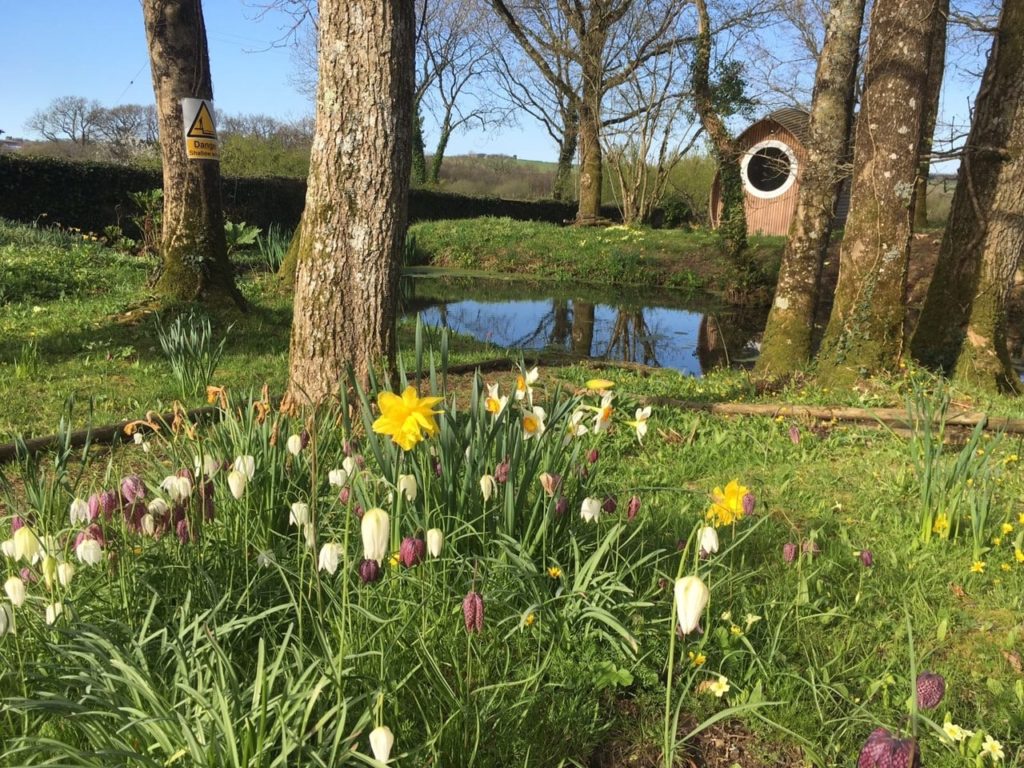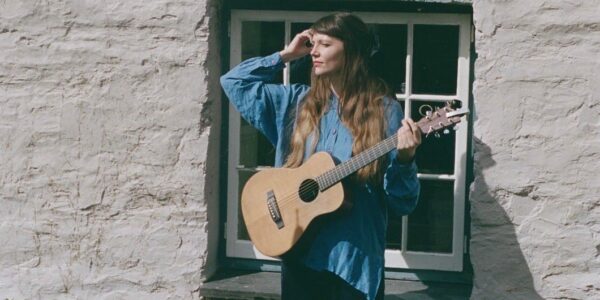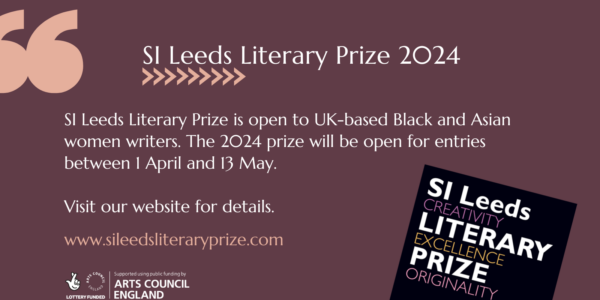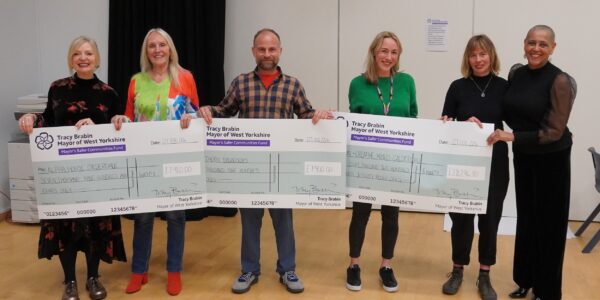Ben Rawlence: Reading, Writing and Publishing in a Changing Climate
25 Aug 2023 / Uncategorized

This post is from a talk given by Ben Rawlence at The Hurst, March 16 2023. It covers ground many of you will have wondered about yourselves: The relationship between publishing and the environment, and the role of both authors and the industry to engage with the reality of a changing planet.
I am honoured to have been invited to work with Mary Morris and Arvon on a season of programming on the theme of Climate and Nature. It is a timely and necessary (long overdue perhaps) task to apply the lens of ecology to all human endeavours. Of course it is not the first time Arvon has addressed the question in relation to creative writing nor will it be the last. But one of my hopes in accepting the job was that this season might germinate some seeds that would take more permanent root in Arvon’s practice: to take the opportunity to reflect on how those of us involved in literary culture and production approach the challenge of our changing climate and rapidly vanishing biodiversity. What does it mean to be writing, reading and publishing at this moment in time? How might the accelerating crisis and looming scarcity of water and food change the way we approach these activities and how we conceive of our responsibilities as citizens, artists, employees or shareholders?
So far I have not referred to climate change as an “issue” because it is not an issue or a theme or topic for a season only – it is an emerging reality. This new reality unfolding has a past, present and a future. A past that has been largely obscured but which is now breaking out into mainstream consciousness and re-writing stories that we thought we knew. A future that is the subject of scientific consensus and significant evidence but still hotly contested in the imagination. And a turbulent present in which our place in the story is even more uncertain than it ever was.
As I have written elsewhere: “The planet we think we live on no longer exists,” and the planet we are currently heading towards is one with a carrying capacity of less than a billion people. Between here and there are some rather large shocks that will disrupt lives, industries and societies.
If this sounds like alarmism let me be plain: A billion people is the estimate of what a four-degree rise in temperature would mean in terms of the shrinking portion of the planet that would be habitable and conducive to producing food. And make no mistake four degrees is where we are headed, if we are lucky. The IPCC is clear that to retain a chance of staying below 2.5 degrees emissions should have peaked in 2022 and started to rapidly decline thereafter. The IPCC is also clear that many of the ocean impacts are already locked in: ocean acidification, ocean warming, sea level rise of at least 2 metres if not, in all likelihood much much more if recent projections of ice sheet collapse in Antarctica are taken seriously. Greenland will be green, it is just a matter of time and that means 70 feet, and 25 metres of sea level rise is inevitable, we just don’t know how soon it will arrive. I can be glib, and sweeping, because I am a writer, summarising scientific findings, not a scientist constrained by academic conventions hedged around with caveats. And that opportunity is part of what I want to convey today.
We are in one hell of a mess and most people, even, perhaps especially, the newspaper-reading public do not appreciate the scale of the trouble.
To the extent that literary culture – reading and writing – is a major part of how societies make sense of, reproduce and, crucially, transform themselves, it has a key role to play in how we navigate, mitigate and adapt to the new realities that are emerging and the coming storms.
But first, the past. And reading. Climate change was, until very recently, almost always discussed in the future tense, but it is already changing how we understand our past; how we read our own history, literary or otherwise.
Books like The Nutmeg’s Curse by Amitav Ghosh written under the pressure of climate change reveal rich new perspectives on cultural and literary criticism. Ghosh re-examines modernity’s dominant narrative of progress and civilization to reveal the complicity of current structures of power and affluence with histories of violence and extraction.
Eco-criticism was once a fringe activity, but now, reading the canon ecologically is all the rage. People are looking for clues as to how we got into this predicament. For example, Martin Puchner in his book Literature for a Changing Planet examines the cumulative effects of narrative over centuries and across cultures in reinforcing the separation of man from nature, romanticising the city over the rural and normalizing what are now understood as harmful practices. He looks again, for example, at The Epic of Gilgamesh and finds in it an ambivalence about the prejudice, violence and superiority of the urban perspective, liberated from the so-called sacred suspicions of the ‘entangled’ wilderness.
Reading is always conducted in the light of present concerns and will be mined for what it can tell us about the connection between the here and then. Did they know? How could they not know? The hinterland of Dominican slave plantations in Jane Austen’s Mansfield Park gives the book, and Austen’s work more broadly, far more importance in how we understand the society of that time. Because it includes the whole of society’s contradictions within the frame, the picture is more real, and more relevant. The same could be said of Dickens, Conrad, Balzac – even Chaucer’s Wife of Bath. Austen knew.
How many twentieth century classics will survive an ecological reading now? Because, whether we like it or not, future readers will read work written during the current period and recent past in the context of the enormous geological transformations taking place. If a book was written at 350 parts per million or 420 parts per million of carbon dioxide will matter. I suspect it will be similar to the way books written in late 1930s Europe can feel uncanny. What could the author have been expected to know? How did that reality shape the work?
350 ppm is the, estimated, safe, level of carbon dioxide in the atmosphere above which harmful impacts start to mount and take on self-reinforcing properties. We left 350 ppm behind in 1984. The irony is worthy of Orwell.
We are deep in the danger zone and ecosystems are starting to fray, food production is being disrupted. Rolling droughts are no longer confined to the Horn of Africa, they are a fixture of life from California to Central Europe. How does that reality, which is no longer merely environmental but is starting to take on social dimensions now too, how does that change the business of writing?
A friend of mine and regular Arvon tutor, the writer Tom Bullough, has spoken publicly about his despair and a resulting sense of futility that writing novels was inadequate to the demands of the moment: he went to get arrested along with other members of Writers Rebel instead. A bit like Orwell and others joining up in World War Two – he felt that action is what society needs at this moment, not fiction.
He has since worked through that despair and found a new purpose in non-fiction, the excellent Sarn Helen. But his struggle is emblematic of many who seek to link their work to the existential crisis of our era with the limited tools at our disposal.
Amitav Ghosh’s earlier book, The Great Derangement confronted the problem head-on, concluding that the novel itself and the conditions of its production result from modernity’s estrangement of humans from nature, and, further, that the form is a key plank in a broader narrative of human exceptionalism that in turn reinforced modernity’s introspective move. Indigenous myths and legends are almost always about other species and natural forces with humans as incidental. While, the novel is, at its heart, a moral human drama.
If books are part of the problem, then writers, more than anyone else, have a problem. But Ghosh’s point was not about books, but about form: that the novel is a particularly problematic way of telling a story and may be more suited in the phrase of Vanessa Andreotti to ‘wording the world’ that is to say, describing it, rather than ‘worlding the world’, i.e. bringing a particular reality into being as ambiguous indigenous myths are (often, but not always) intended to do.
If we want stories to re-make the world, we must do more than simply describe it as it is, the argument goes. However, stories must do both. And perhaps, if we can describe the world as it is, and as it is changing, honestly and clearly then the case for a new world will be made. This is what The Treeline, my latest book tried to do, to turn the page on nature writing as apolitical balm for a world out of whack, but to describe the whackness!
To be a story-teller at a time when even newspapers and corporate boardrooms are calling out for new stories of our place in the world is an exciting time to be working and writing, but, as Ghosh has so cogently argued, we are up against the limits of the ways and means of telling stories upon which we have hitherto relied. In this connection, I am pleased that this season brings screenwriters and novelists together and features eco-poetry as a genre with a central place for writing for children. If we are driven by stories above all and their power to move, then we must be agnostic about the form.
Some writers are responding to this challenge by innovating with character – introducing non-human characters for example like Richard Powers The Overstory, or the tree protagonists of The Treeline. Others are finding fresh license with genre and its capacity to ‘world’ the world, as with Kim Stanley Robinson’s Ministry for the Future.
This is not to argue that all writers must now devote themselves to cli-fi – far from it. But to point out that in as much as writing is successful in terms of the truth it conveys or the world it creates, the existence and acknowledgement of new emerging truths about the world will have a bearing on what work is produced, how it is done and – to the extent that it captures that truth – how good it is.
It may not be immediately apparent, but the polluted atmosphere and its accelerating impacts frames and affects the choices writers, readers and characters make, whether or not they are mindful of the unsustainable amount of carbon dioxide in the air they are breathing. Even words and concepts are becoming unstable – the sea and the air are not what they were, their actual chemistry has changed. ‘Forest’ is a collection of species that is evolving faster than words can describe. Never mind the fact that seasons are increasingly haywire and will soon be meaningless altogether.
This is the point I would like all writers and writing coaches to take away: the new reality is here and whatever you write will be read by its lights – in that changing atmosphere, under that changing sky – if not in relation to it directly. As the famous poster at COP26 in Glasgow said, “We are not defending nature, we are nature defending itself”. We are nature, and to that extent, the climate and ecological emergency is central to who we are and why we find ourselves in an affluent society, equipped with these gifts and these opportunities at this point in history. To seek to understand the human condition without being centrally aware of that most salient of facts, the fundamental contradiction of modern life in the twenty-first century is to misread the moment spectacularly and thus risk irrelevance over the long haul.
Writers will respond, are responding, to this changing reality depending on their own sense of connection or responsibility towards the times, and will be judged in time accordingly. But what about publishing houses, what is their responsibility at an unprecedented moment like this?
At Black Mountains College we’ve designed a programme for organisations called ‘Radical Adaptation’ – an interdisciplinary journey that interrogates individual and corporate purpose and practice in the light of accelerating climate impacts. I won’t go into lots of detail, but suffice it to say, having FSC paper or a net zero target for emissions is insufficient and staff, customers and shareholders are starting to ask much harder questions and expect much more robust answers to the challenge of planetary limits. Over-production and over-consumption – especially of discretionary products – are becoming the central challenge of sustainability. In responding, communication, commitment and authenticity (think the clothing company Patagonia) are key.
One might say that books and publishing houses play a critical role in our culture and public sphere – books are not ‘just’ products and publishers are not ‘just’ profit-driven corporations. But for that to be believed, publishers would need to demonstrate that they are not solely driven by commercial concerns. What titles might a house choose to promote or acquire if the editorial and marketing criteria included duties relating to shaping the public discourse? What new public role or broader alliances with libraries, schools and bookshops might emerge from a re-basing of a corporation’s mission statement to include people and planet alongside returns to shareholders?
If we understand the proper response to climate change to be systems change, then the question facing us all is: where do we locate ourselves in the arc of the process?
If companies: publishers, bookstores, literary agents – more so than writers as such whose first responsibility is a more complex duty to their own creative voice – were to embrace such a social calling, how might that change the understanding of their business model?
The opportunities are many. In an age of disinformation, short attention spans and fake online news what role could publishers of serious, vetted, books, play today? What would, for example, a commitment to public education on climate change where the government has so singularly failed, look like? What could publishers and other industry actors working together achieve?
Might there be something to learn from the experience of the US Council on Books in Wartime that brought together publishers during World War Two gave away 122 million books to soldiers on active duty and then sold millions more for pennies in order to grow the market? Crucially, it took the decision to give away not the popular comics and westerns but high-brow literary classics and history to ‘educate and inspire’, forgoing huge sums in the process but demonstrating patriotism and a long-term bet on the future of reading and the imagination of the public. It was an act of faith in the future, with real commercial costs. Is there such vision at PRH or Hachette and their fellows today?
We need such bets, such grand gestures and vision at a moment like this. There is no time for incremental moves.
The status quo is gone. Accepting that the planet we thought we knew is in many respects a zombie – walking dead – is hard. But it is the first step towards a proper reckoning with the options remaining and the scale of the task of adaptation and resilience ahead. I have lost count of the times I have talked to colleagues about sub-editors and publishers who have notes of ‘hope’, to dial down the scary stuff. But the ingenuous grafting of an optimistic ending onto a serious work of reportage rings hollow. True hope is not about a prayer for the maintenance of an unsustainable lifestyle founded on violence and extraction. True hope is an abiding interest in the possibility, in the eternal exploration of the mysteries and wonders of life, human or otherwise, and why, at the very least, even in the darkest of hours we speak of ‘bearing witness’ as the minimum contribution one human can offer. That exploration and witnessing is what we look to writers to do. And what we need them more than ever to do at the current time. If we think writing and stories are important in how we navigate change and uncertainty then the whole food chain – or dare I say ecosystem – of literary production and consumption needs to take a long hard look at the science, and then look in the mirror.
Ben Rawlence is Arvon’s Summer 2023 Writer in Residence. He is the author of Radio Congo, City of Thorns, and, most recently, The Treeline.




